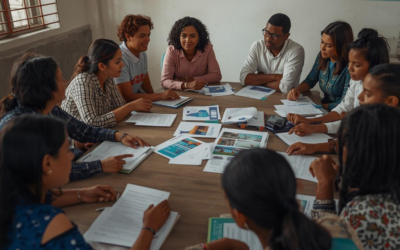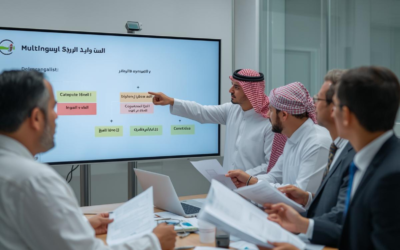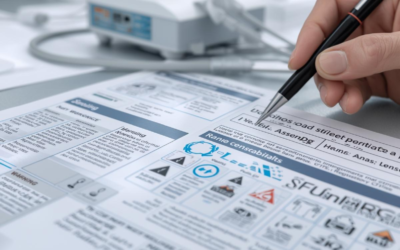Medical translation is a crucial specialization within the healthcare industry, especially in an increasingly globalized world. However, beyond accuracy, translation services in this field face ethical and technological challenges that directly impact patient confidentiality and safety. Medical translation companies must be aligned with the latest trends and technologies to ensure that their work maintains the integrity of information and respects privacy rights.
Key Ethical Challenges and Concerns in Medical Translation
Healthcare and pharmaceutical companies, as well as research organizations, must ensure that medical information is translated accurately and confidentially. Among the main challenges are:
- Managing Sensitive Patient Information: Personal and health information must be handled with the utmost care. Leaks or misinterpretations can severely impact patient privacy and even have legal consequences.
- International Regulations: Complying with regulations like HIPAA in the United States or the GDPR in Europe has become a requirement for any company handling patient data. This is especially complex for multinational projects, where each country has specific regulations.
- Precision in Medical Terminology and Avoiding Translation Errors: A single error in medical translation can have severe consequences. For instance, the incorrect translation of a term in a clinical trial protocol could affect study results or compromise patient health.
- Cultural Awareness and Sensitivity: Beyond technical accuracy, medical translation must be culturally appropriate to ensure content is understood correctly in local contexts. This is a vital aspect when communicating diagnoses or medical instructions.
Trends in Medical Translation to Address Challenges
- Automation and Artificial Intelligence in Medical Translation: Artificial intelligence (AI) tools are transforming medical translation, speeding up processes and improving the accuracy of medical terms. However, it’s essential that these tools are used under human supervision to avoid errors or ethical issues related to data privacy.
- Translation for Decentralized Clinical Trials: With the popularization of decentralized clinical trials (DCTs), in which patients can participate remotely, the translation of clinical documents and materials has become even more complex. This involves precise adaptation of questionnaires and consent forms in multiple languages and dialects.
- Focus on Patient Experience: Today, there is an increasing emphasis on improving patient experience through clear and culturally appropriate translations of their medical interactions. This entails careful adaptation of materials that are not only technically accurate but also empathetic and accessible to the patient.
- Digital Security and Confidentiality: With the rise of cyber threats, the use of secure tools and platforms that protect health data has become a priority. Translators and companies must adopt encryption technologies and secure platforms that comply with international data protection standards.
Technologies and Solutions for Confidentiality in Medical Translation
- Secure Translation Management Platforms (TMS): TMS platforms allow large volumes of information to be managed securely and centrally, limiting access to sensitive documents to authorized personnel.
- Advanced Encryption Technology: Medical translation companies are adopting end-to-end encryption and password management to protect sensitive health data. These technologies ensure that information remains private, even if systems are compromised.
- Data-Protective Artificial Intelligence: While AI is valuable for the automated translation of documents, companies handling medical data must use AI tools that guarantee data confidentiality, avoiding unauthorized storage on third-party servers.
Success Stories: How Companies and Hospitals Improve Communication with Ethical, Accurate Translation
Several recent examples demonstrate how ethical and confidential medical translation has helped hospitals and laboratories improve communication in multicultural settings:
- Multilingual Hospitals: In countries like the United States and Canada, some hospitals have implemented real-time translation services for communication between doctors and patients who do not speak the same language. These services require absolute precision and strict confidentiality control to protect patient information.
- Translation in International Clinical Trials: Large pharmaceutical companies have turned to specialized translation services for their international clinical trials. These companies ensure that documents are accurately adapted to each language while respecting local regulations and privacy standards.
How SumaLatam Responds to Challenges and Adapts to Trends
SumaLatam has developed a comprehensive and ethical approach to addressing the complex challenges of medical translation. The company stands out for:
- Commitment to Ethics and Confidentiality: All SumaLatam projects are conducted under strict confidentiality agreements, and the team is trained in international regulations such as HIPAA and GDPR. This ensures data privacy and the protection of sensitive patient information at every stage of the process.
- Cutting-Edge Technology and Human Oversight: At SumaLatam, technology is an ally for improving efficiency and precision, but each medical translation undergoes human review by experts in medical and cultural terminology. This ensures that each document is not only accurate but also culturally appropriate.
- Personalized and Specialized Attention: SumaLatam works closely with its clients to understand each project’s specific needs. This personalized approach allows translations to be adapted to the cultural and linguistic needs of patients, ensuring clear and effective communication.
- Advanced Security Tools: The company uses secure translation management platforms and encryption tools to protect sensitive data. This allows clients to trust that their information is safe and meets the strictest industry regulations.
Ethics and confidentiality in medical translation are essential pillars that not only protect the patient but also build trust between healthcare providers and translation services. By staying at the forefront of sector trends and technologies, SumaLatam ensures it delivers translation solutions that uphold the highest standards of ethics and privacy, contributing to improved healthcare quality worldwide.





